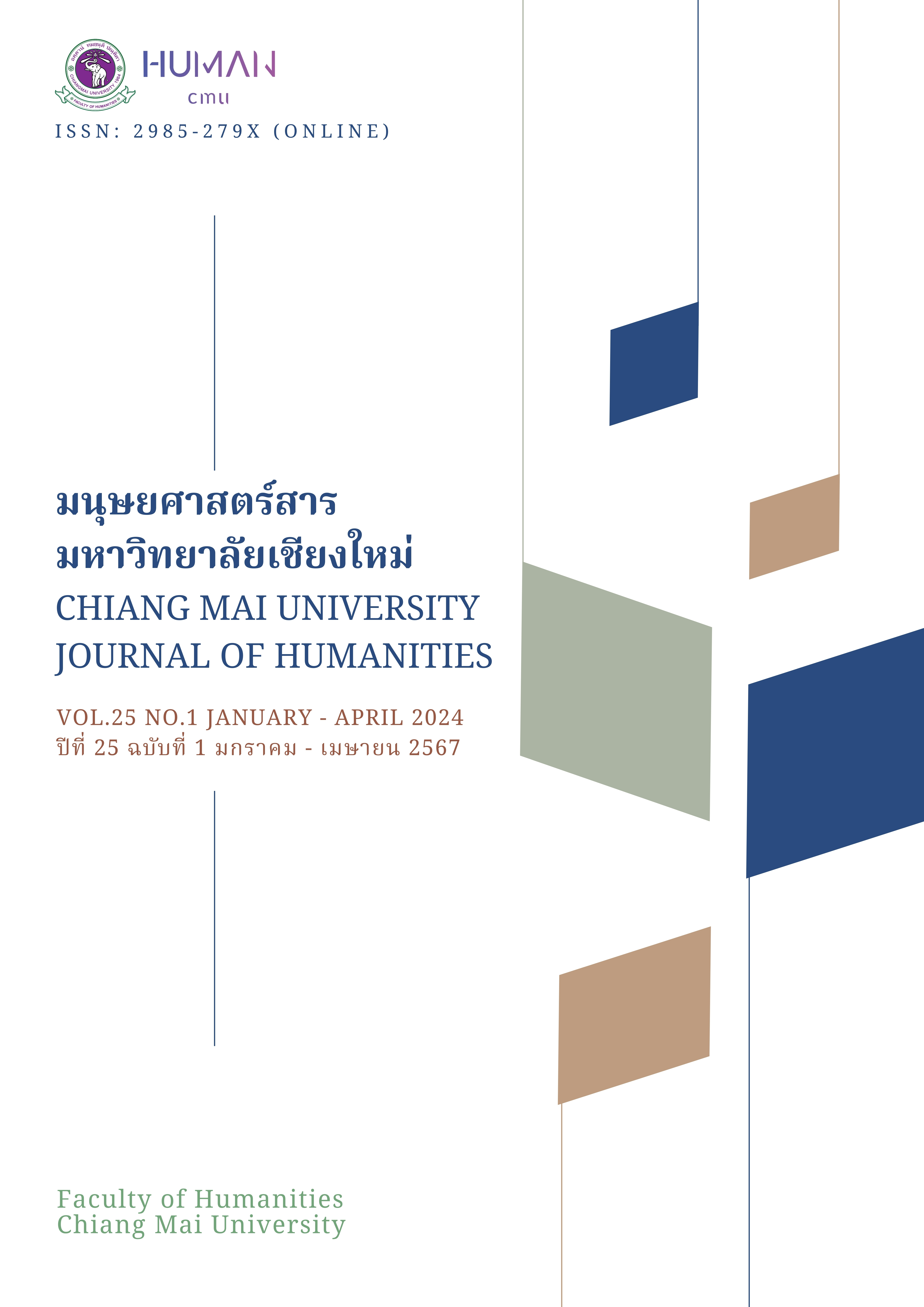การทำนายเจตนาที่จะเรียนรายวิชาออนไลน์เพื่อการเรียนรู้ตลอดชีวิตของนิสิตระดับชั้นปริญญาตรีด้วยทฤษฎีพฤติกรรมตามแผน กรอบความคิดแบบเติบโต และแรงจูงใจภายใน
Main Article Content
บทคัดย่อ
รายวิชาออนไลน์เป็นหนึ่งทางเลือกที่สามารถขยายโอกาสการเรียนรู้ และช่วยส่งเสริมทักษะการเรียน รู้ตลอดชีวิต การวิจัยครั้งนี้มีวัตถุประสงค์เพื่อศึกษาการทำนายเจตนาที่จะเรียนรายวิชาออนไลน์เพื่อการเรียนรู้ตลอดชีวิตของนิสิต ด้วยทฤษฎีพฤติกรรมตามแผน โดยศึกษาอิทธิพลร่วมทำนายของกรอบความคิดแบบเติบโต และแรงจูงใจภายใน กลุ่มตัวอย่างคือนิสิตระดับชั้นปริญญาตรีจำนวน 325 คน เก็บรวบรวมข้อมูลโดยใช้แบบสอบถาม ผลการวิจัยพบว่า เจตคติต่อการเรียนรายวิชาออนไลน์เพื่อการเรียนรู้ตลอดชีวิต การคล้อยตามกลุ่มอ้างอิง การรับรู้การควบคุมพฤติกรรม กรอบความคิดแบบเติบโต และแรงจูงใจภายใน สามารถร่วมกันทำนายเจตนาที่จะเรียนรายวิชาออนไลน์เพื่อการเรียนรู้ตลอดชีวิตของนิสิตได้อย่างมีนัยสำคัญทางสถิติ (R 2 = .519, p < .001) โดยเจตคติต่อการเรียนรายวิชาออนไลน์เพื่อการเรียนรู้ตลอดชีวิต (b = .192, p < .001) การคล้อยตามกลุ่มอ้างอิง (b = .276, p < .001) การรับรู้การควบคุมพฤติกรรม (b = .236, p < .001) และแรงจูงใจภายใน (b = .266, p < .001) มีน้ำหนักในการทำนายเจตนาที่จะเรียนรายวิชาออนไลน์เพื่อการเรียนรู้ตลอดชีวิตของนิสิตได้อย่างมีนัยสำคัญทางสถิติ ผลการวิจัยนี้สามารถนำไปใช้เป็นข้อมูลสำหรับการสื่อสารเพื่อโน้มน้าวให้นิสิตมีเจตนาที่จะเรียนรายวิชาออนไลน์เพื่อการเรียนรู้ตลอดชีวิต
Article Details

อนุญาตภายใต้เงื่อนไข Creative Commons Attribution-NonCommercial-NoDerivatives 4.0 International License.
เอกสารอ้างอิง
กวินธร รัฐอาจ. (2558). การพัฒนารูปแบบการเรียนการสอนแบบห้องเรียนกลับด้านด้วยคลังรายวิชาออนไลน์แบบเปิด. วารสารศึกษาศาสตร์ มหาวิทยาลัยสารคาม, 10(ฉบับพิเศษ), 70–82.
ชัชวาล ศิลปะกิจ, อรวรรณ ศิลปะกิจ, และรสสุคนธ์ ชมชื่น. (2558). ความตรงของแบบวัดกรอบความคิด. วารสารสุขภาพจิตแห่งประเทศไทย, 3(23).
นรีรัตน์ พิทักษ์มงคล. (2560). แรงจูงใจในการเรียนออนไลน์ที่ส่งผลต่อประสิทธิภาพการเรียนของนักศึกษามหาวิทยาลัยรามคำแหง. วารสารรามคำแหง, 3(23).
วัชรพงษ์ สืบศิริ. (2562). ปัจจัยที่มีอิทธิพลต่อความตั้งใจในการใช้เฟซบุ๊กไลฟ์เพื่อการเรียนเสริมรายวิชาคณิตศาสตร์ของนักเรียนชั้นมัธยมศึกษา. (ศึกษาศาสตร์มหาบัณฑิต, มหาวิทยาลัยธรรมศาสตร์).
วิสสุตา ภักดีกุล. (2564). ความสัมพันธ์ระหว่างกรอบความคิดแบบเติบโตและการผูกใจมั่นในการเรียนรู้ออนไลน์โดยมีการรับรู้ความสามารถเป็นตัวแปรส่งผ่าน และการสนับสนุนอิสรภาพเป็นตัวแปรกำกับ. (ศิลปศาสตรมหาบัณฑิต, จุฬาลงกรณ์มหาวิทยาลัย)
ศูนย์จิตวิทยาการศึกษา. (2558). อัจฉริยะหรือพรสวรรค์ ไม่สำคัญเท่า Growth Mindset. สำนักงานคณะกรรมการการศึกษาขั้นพื้นฐานและศูนย์จิตวิทยาการศึกษา มูลนิธิยุวสถิรกุล.
สำนักงานสภานโยบายการอุดมศึกษา วิทยาศาสตร์ วิจัยและนวัตกรรมแห่งชาติ. (2563). การส่งเสริมการเรียนรู้ตลอดชีวิตเพื่อรองรับการพลิกโฉมฉับพลันและวิกฤตการณ์โลก (พิมพ์ครั้งที่ 1). กลุ่มยุทธศาสตร์กำลังคนในระบบการอุดมศึกษาวิทยาศาสตร์ วิจัยและนวัตกรรม.
Ajzen, I. (1986). From Intention to Action: A Theory of Planned Behavior. Springer.
Ajzen, I. (1991). The theory of planned behavior. Organizational Behavior and Human Decision Processes, 50, 179-211.
Alhamami, M. (2018). Beliefs about and intention to learn a foreign language in face-to-faceand online setting. Computer Assisted Language Learning, 2(31), 90-113.
Deci, E. (1975). The intrinsic motivation of behavior. Springer.
Dweck, C. (2006). Mindset: The New Psychology of Success: How we can learn to fulfill our potential. Ballantine.
Limeri, L. B., Carter, N. T., Choe, J., Haper, H. G., Martin, H. R., Benton, A., & Dolan, E. L. (2020). Growing a growth mindset: Characterizing how and why undergraduate students’ mindset change. International Journal of STEM Education, 7(1). 1-19.
Ryan, R. M. (1997). Intrinsic Motivation Inventory (IMI). Selfdeterminationtheory. http://selfdeterminationtheory.org/intrinsic-motivation-inventory/.
Shively, R. L., & Ryan, C. S. (2013). Longitudinal change in college math students’ implicit theories of intelligence. Social Psychology of Education, 16(1). 241-256.
Sun, Y., & Gao, F. (2020). An investigation of the influence of intrinsic motivation on students’ intention to use mobile devices in language learning. Journal of Education Technology Research and Development, 3(68), 1181-1198.
Tagoe, M., & Abakah, E. (2014). Determining Distance Education Students’ Readiness for Mobile Learning at University of Ghana Using Theory of Planned Behavior. International Journal of Education and Development using Information and Communication Technology, 10(1), 91-106.
Yeager, D., Hanselman, P., Walton, G., Murray, J.,…Hinojosa, C. (2019). A national experiment reveals where a growth mindset improves achievement. Nature, 573(7774), 364-369.


